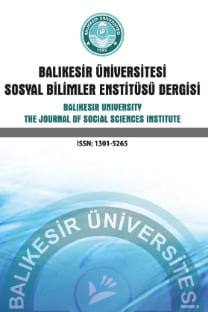İkinci Dil Öğrenme Algılarının Belirlenmesi: Balıkesir Örneği
Küreselleşen dünyada ikinci dil eğitimi giderek daha çok önem kazanmakta, ancak artan öneme koşut olarak konuyla ilgili yakınmalar da giderek artmaktadır. Bu çalışmada ikinci dil öğrenmeyle ilgili yazın alanında yapılan çalışmalar ile lise ve üniversite düzeyinde ikinci dil öğrenenlerin algıları karşılaştırılmıştır. Veriler dil ağırlıklı eğitim yapan Balıkesir Sırrı Yırcalı Anadolu Lisesinde, Balıkesir Üniversitesi Necatibey Eğitim Fakültesi İngilizce Öğretmenliği Programında ve Turizm İşletmeciliği ve Otelcilik Yüksekokulunda öğrenim gören öğrencilere uygulanan likert tipi anketten elde edilmiştir. Elde edilen veriler nicel ve nitel bir yöntemle çözümlenmiştir. Öğrenenlerin ikinci dil öğrenmeye karşı olumlu, ancak sürecin sonucuna yönelik olumsuz bir tutum sergiledikleri görülmüştür. Alan yazınında ortaya çıkan sonuçlar ile katılımcıların öğrenme stillerinin örtüşmediği, bunun için dil öğretimindeki bakış açısının ve kullanılan kavramların gözden geçirilmesi gerektiği sonucuna varılmıştır
Anahtar Kelimeler:
nicel ve nitel yöntem, ikinci dil, öğrenme-edinim, dil sistemi
The Learners’ Perceptions of Second Language Learning: The Sample of Balıkesir
Second language teaching is gaining more and more importance in the global world. However, displeasure about language teaching also increase. The purpose of the present study is to compare the results of the previous studies to the perceptions of second language learners who are studying in high school and university. The data were obtained from a 5-Likert questionnaire administrated to the students who are studying in Balıkesir Sırrı Yırcalı Anatolian High School ,The Department of English Language Teaching, and School of Tourism and Hotel Management at Balıkesir University. The data were analyzed through the quantitative and qualitative methods. The results of the study demonstrate that the students have positive attitudes towards second language learning but that they have negative attitudes towards the end of the second language learning process. It is concluded that the results of the previous studies is not consistent with the learning styles of the participants. Therefore, it is suggested that judgements about language teaching and conceptions used in this area should be reconsidered
Keywords:
quantitative and qualitative method, second language, learning-acquisition, language system,
___
Bally, C. (1951) Traité de stylistique française, Tome 1, Librairie C. Klincksieck, Pa- risCadre Européen Commun de Référence pour Les Langues, Division des Politiques Linguistiques (2001) Les Editions Didier, Paris
Chomsky, N (1965 ) Aspects de la théorie syntaxique, Fransızca çeviri Jean-Claude Milner (1971), Edtion du Seuil, Paris.
Cook, V. (1993) Linguistics and second language acquisition, Palgrave, New York.
Çiçek ( 2003) « Du Rôle de la Langue Maternelle sur l’Apprentissage d’une Langue
Étrangère: Cas du Turc de Turquie Contemporain », Colloque de la Faculté de Pédagogie de l’Université d’Uludağ / « Common European Framework and Fo- reign Language Education in Turkey », ISBN : 6149-08-6, 16 pages, BURSA / TURKEY.
Ellis, R. ve Barkhuzen, G. (2005) Analysing Learner Language (Oxford Applied Lin- guistics), Oxford University Press, USA
Giordan, A. (1998 ) Öğrenme, Türkçe çeviri Baştürk, Bozavlı ve Tulan (2008) De ki yayınevi, Ankara
Haznedar, B. ve Gavruseva, E. (2008) Current Trends in Child Second Language Ac- quisition: A Generative Perspective, Jhon Benjamins Publishing Company, Ams- terdam/Philedelphia.
Krashen, S. (1982) Principles and practice in second language acquisition, Perga- mon Press Inc.
Lightobwn P, M. ve Spada, N. (199) How Languages are learned? Oxford Univer- sity Press Meillet, A. (1954) La méthode comparative en linguistique historique, Librairie Honoré Champion, Paris
Punch, K. F, and Punch, Keith (2005) Introduction to Social Research: Quantitative and Qualitative Approaches, Sage Publications Ltd, California
Saussure, F. (1972) Cours de linguistique générale, Edition Payot, Paris
- ISSN: 1301-5265
- Yayın Aralığı: Yılda 2 Sayı
- Başlangıç: 1998
- Yayıncı: Balıkesir Üniversitesi Sosyal Bilimler Enstitüsü
Sayıdaki Diğer Makaleler
Evliya Çelebi’nin Bandırma, Aydıncık Edincik ve Erdek İle İlgili Verdiği Bilgiler ve Bunların Değeri
İdâdînin Son Yıllarından Liseye: Karesi Sultânîsi 1913-1923
Mustafa Murat ÖNTUĞ, Kamil UYGUN
Balıkesir’de Masal Anlatma Geleneği ve Masalların İşlevsel Yitirilişi Üzerine Değerlendirmeler
İkinci Dil Öğrenme Algılarının Belirlenmesi: Balıkesir Örneği
Hasan Basri Çantay’ın “Kur’ân-ı Hakîm ve Meâl-i Kerîm” Adlı Eseri Üzerine Bir Değerlendirme
II. Dünya Savaşı Yıllarında Kahve İhtikârının Balıkesir’e Yansımaları
Madra Dağı’nda Geleneksel Yayla Göçü
Balıkesir Çepnilerinde Ağıt Geleneği ve Ağıtçı Kadınlar
Bursalı Velilerin Balıkesirli Halifeleri
